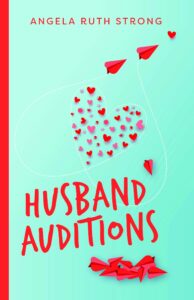by Angela Ruth Strong, @AngelaRStrong
Writers are the opposite of athletes, they get better with age. -Aaron Sorkin
I sold my first story to a national magazine when I was sixteen. Granted, I’d grown up with a mom who sold stories about me to magazines like Women’s World, so I just figured that’s what you did. When a basketball player ran into me while I was cheerleading, knocking me into the bleachers and breaking four of my ribs, I wrote about it and sent it to American Cheerleader Magazine.
They bought it for $100. It was the easiest money I’d ever made, and I decided to study journalism in college. It’s never been that easy since.
I got married and started my family young too, so I didn’t ever have that dream job at a magazine or newspaper. Instead, I spent hours at the library story time and researched picture books. I sold some of my manuscripts to magazines like Hopscotch. Others were taken to acquisitions meetings at publishing houses, but I never got “the call.”
My kids aged, and thus so did my audience. My short story The Water Fight Professional was picked up by an anthology then by the New York School Board to be used in over half a million school tests. That was pretty cool. I turned it into a middle grade novel. This time, I got “the call” but the small press ended up shutting its doors before publication day.
Meanwhile, I discovered the library had adult reading programs too. I read suspense and romance novels and began to wonder if I could write fiction for women.
I finished my first full-length manuscript and attended a conference in 2006. I was 27, and one of the youngest there. I had so much to learn, and I don’t mean just about writing. But about life.
After moving to Idaho, I attended a writer’s group where Robin Lee Hatcher spoke. She said a couple things that puzzled me. First, her writing advice was to “live.” Um, weren’t we already doing that? Second, she said that every novel she writes gets harder because she learns more and puts more pressure on herself to do better. That sounded bizarre. Because I’d assumed learning more would make writing easier.

In the past fifteen years since I finished my first novel (and somehow got an agent for it), I have done a lot of what Robin calls living.
I have taken risks. I have failed miserably. I have gotten lucky.
I have made mistakes. I have faced death. I have lost everything. I have won unexpectedly.
I have been abandoned. I have been adored.
I have questioned faith, morality, and purpose. I still have lots of questions.
I’ve laughed as much as I’ve cried, loved as much as I’ve hurt, and chosen forgiveness because I knew how much I needed it myself.
All this living has given my writing more depth. Now I look back on my first novel and wonder why anybody enjoyed it.
I honestly don’t think I deserved that first book sale. I think God gave it to me before I’d done the living so I would continue to write once I really had something important to say.
And maybe it’s having something important to say that makes writing so much harder. If I’m going to be authentic, I’ve got more garbage to expose. If I want my message to resonate with truth, I have to dispel the lies in my own life. If I’m going to ponder real conflicts, I have to face the pain I’ve seen experienced on both sides of a debate.
That’s where I’m at. I don’t want to write more. I want to write better. Which has somehow brought me full circle to a new picture book proposal. One that makes me both laugh and cry. My old ones didn’t have that power.
So wherever you’re at, whatever you’re living through, however hard this writing thing is becoming, know it just means you have more to offer our world through your words. We may not be as young as we used to be, but we can always see ourselves as just getting started.
In a world full of happily-ever-after love, Meri Newberg feels like the last young woman on the planet to be single, at least in her Christian friend group. So when she’s handed a strange present at the latest wedding–a 1950s magazine article of “ways to get a husband”–she decides there’s nothing to lose by trying out its advice. After all, she can’t get any more single, can she?
Her brother’s roommate sees the whole thing as a great opportunity. Not to fall in love–Kai Kamaka has no interest in the effort a serious relationship takes. No, this is a career jump start. He talks Meri into letting him film every silly husband-catching attempt for a new online show. If it goes viral, his career as a cameraman will be made.
When Meri Me debuts, it’s an instant hit. People love watching her lasso men on street corners, drop handkerchiefs for unsuspecting potential beaus, and otherwise embarrass herself in pursuit of true love. But the longer this game goes on, the less sure Kai is that he wants Meri to snag anyone but him. The only problem is that he may not be the kind of husband material she’s looking for . . .
Angela Ruth Strong sold her first Christian romance novel in 2009 then quit writing romance when her husband left her. Ten years later, God has shown her the true meaning of love, and there’s nothing else she’d rather write about. Her books have since earned TOP PICK in Romantic Times, been optioned for film, won the Cascade Award, and been Amazon best-sellers. She also writes non-fiction for SpiritLed Woman. To help aspiring authors, she started IDAhope Writers where she lives in Idaho, and she teaches as an expert online at WRITE THAT BOOK.


